Ukraine is the greatest power of this generation
Captain Arsen Fedosenko showed us the value of Ukrainian victory, and the futures of Ukraine
Kyiv, Ukraine
In Kyiv, the cadence of the loss drowns in liminality. Funerals happen among weddings and birthdays, the living and the dead share phone books and streets, war and regular life are like the lit windows of commuter trains passing in opposite directions in the night.
“Maybe it seems strange,” says a friend briefly in Kyiv before his next rotation back to the front. We’re sitting in an ice cream shop that feels like early summer in absolutely any European city. “But this is absolutely important for us. I can go to the war, I focus on my mission. But when I am in Kyiv, I can live this normal life a little.”
This island of normal life was, it should not be forgotten, hard won. That Kyiv was saved by Ukrainian defenders remains the point from which all potential futures in Ukraine now depart. With its air defense in place, it is an unwalled fortress of Ukrainianness. Children go to school, they go to the mall with their friends. People go to work, they go to cafes, they stop in the bookshop — perhaps to choose the latest Ukrainian book about the war, or a selection of Ukrainian literature or history, the revival of which has been bolstered by a decade of Russia trying to steal it from them, again. The primal wail of the air raid siren scratches deep into the psyche, a reminder that these are not normal times. Even in the silence, in the rain, in traffic, in the sound of passing crowds — the phantom alarm is a hollow that the ears strain to fill. Not reacting at all is a badge of resilience. Even the birds continue singing. Everything is the same as the moment before. “If you hear the sirens, you are still alive.”
From every meeting or encounter, there are generational family stories. Children far away growing up without you, or waiting to be picked up, or stolen by invaders. Grandmothers who never wanted to see such times in Ukraine again, who cannot bear the losses, who know already how to manage in the blackouts and wonder when you are coming to help in the vegetable garden. A generation that gained their freedom, took twice to the streets to ensure it, then mobilized a million men and women in a decade-long war for the audacity of their insistence that they want nothing to do with Moscow and don’t want to have to bleed for Russian imperial delusions ever again.
There are a lot of different kinds of Ukrainians who have chosen to fight this war against Russia. This war against Moscow’s unapologetic aggression. This war to keep all of us free.
One of those was Captain Arsen Fedosenko. His photographs of the war are all throughout this piece. On Thursday, his friends and family and the men and women he served with and for in the Armed Forces of Ukraine gathered in Kyiv for his burial. He died from injuries sustained in the line of duty in the Kharkiv region.
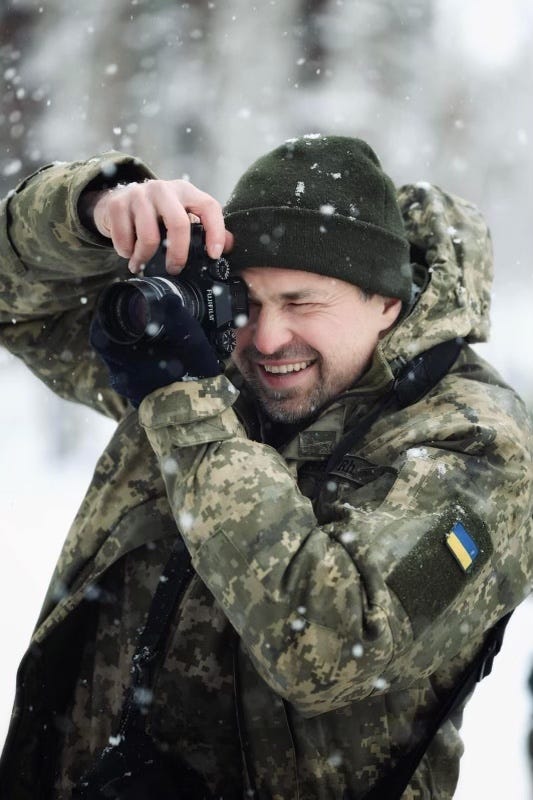
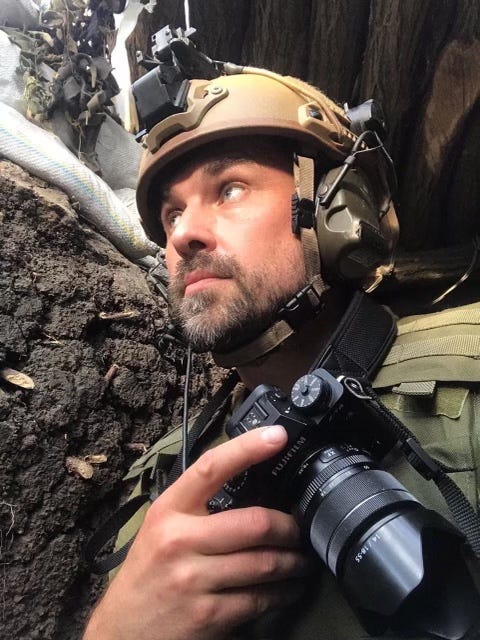
On social media, we see heroes and recruits, we see soldiers who have fought this whole decade, we see medics who save lives, we see the drone operators who are the new snipers of this war. We have scattered recognition of the writers and poets and politicians, the athletes and artists and activists who also serve and too often fall. These are mostly anomalous for us who are not facing a call to service that requires us to risk our life to save our whole nation from annihilation.
But many, many Ukrainians have chosen to fight. And a good number of their faces — the ones the really stay with you — were photographed by Fedosenko.
Arsen Fedosenko was a celebrated photographer before Russia tried again to swallow Ukraine. He filmed and photographed the Revolution of Dignity on the Maidan. One thing he was well-known for were his pictures of Ukrainian vineyards and wine, and his desire to make wines that would represent what he loved about Ukraine and the unique terroir of Bakhmut. These photos are full of nature and sunlight and color and beauty. They are taken by a man who celebrated life.

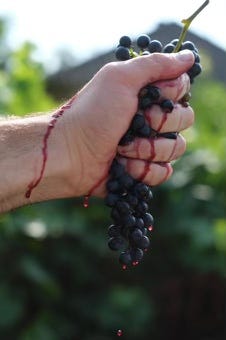
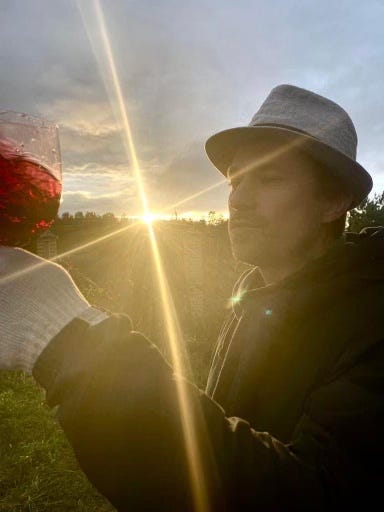
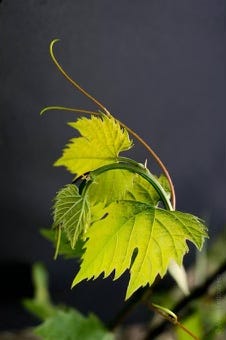
In February 2022, he found himself taking photographs of Ukrainian soldiers evacuating civilians from Irpin, near Bucha and Hostomel — names now famous for the brutality, destruction, and terror that Russian invaders managed to exact during their short-lived and failed attempt to capture Kyiv at the beginning of the full-scale invasion. Gone are the greens of vines and the reds of wines and the sparkling golden sunlight — now the only color in the photographs is the survival of humanity standing against the scarred and burned-out grayscale of Russian aggression. The starkness of the landscape showed him what needed to be protected. “The existence of Ukraine is not a part of Russia’s plans. Our chance to survive as a nation is to fight with the weapons that we have in hand.”
Fedosenko soon joined the Armed Forces of Ukraine. He was then 44 years old, and had a wife and two sons who he did not want to imagine having to fight the Russians. Because of his tremendous talent, he was selected for service in the media team of the AFU Stratcom unit. The unit is full of photographers and cameramen and journalists and writers who were willing to turn their talent into a vital weapon for Ukraine. They deploy all along the frontlines to capture the stories of the war in places where civilians can’t go. Sometimes, this is the war itself. Sometimes, it is the quiet between the battles. Sometimes, it is the aftermath, the necessity to capture the evidence of Russian war crimes to ensure they cannot be forgotten — that justice will find every member of the enemy forces that committed them.
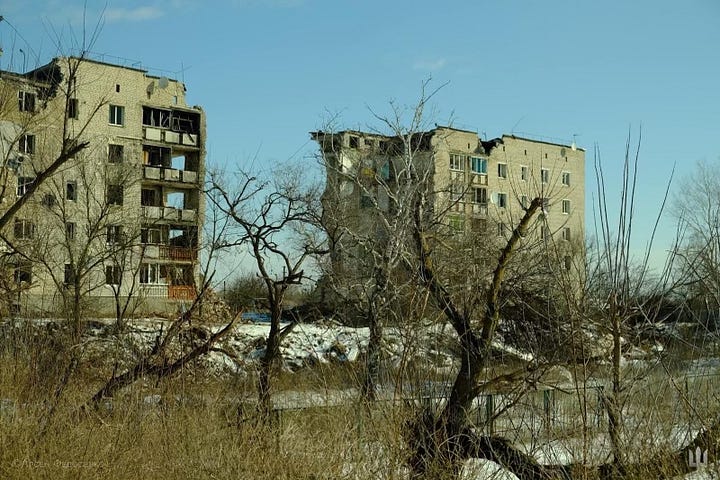


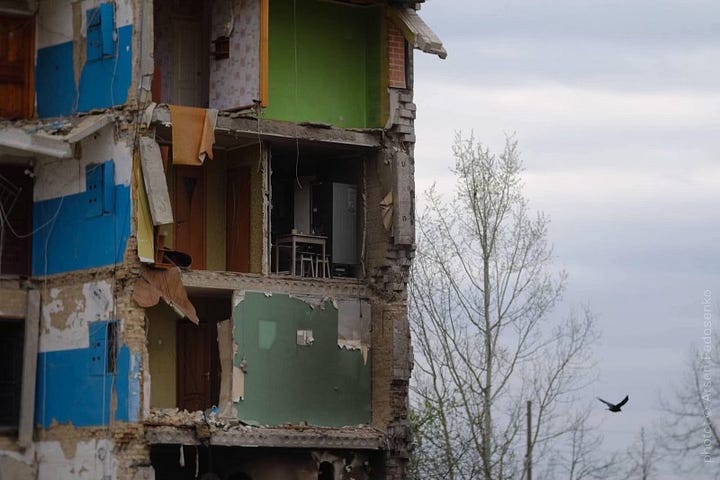
Fedosenko had a knack for war photography, unflinching under fire, always looking for the moment that needed to be captured on film. He quickly became the soul of the team, a steady, professional presence whatever the circumstances. No matter where he went, his teammates say, he had a thousand different conversations with the soldiers and civilians caught up in the war — conversations about better times, and the future, and dreams of everything that Ukraine would be. The soldiers he served with say they never saw him sad — concerned, maybe worried, but never sad. Fedosenko brought sunlight with him where sometimes there was none to be had.

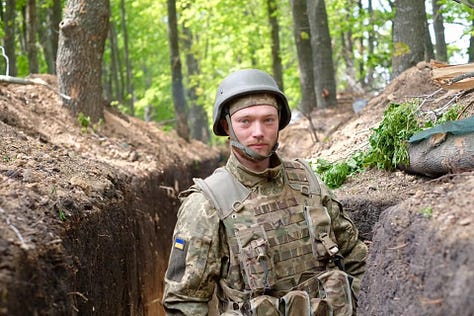
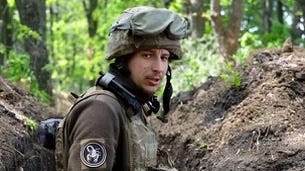
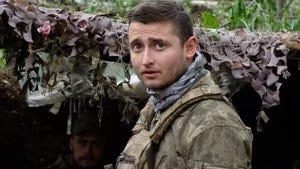
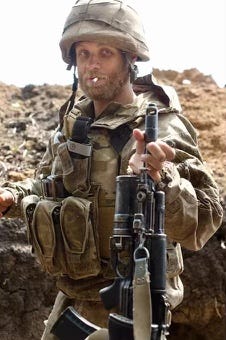
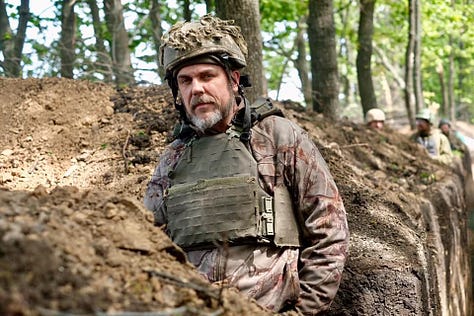
In May of 2022, his photos showed the soldiers manning Ukraine’s new trench lines, telling the story of their brotherhood and good humor and exhaustion and every day life. They also showed the liberation of settlements in Kharkiv — how civilians had lived under Russian occupation. Even in the bunkers, Fedosenko finds elegant Ukrainian resistance — hand drawn national flags, a small jar of deep purple spring lilacs, strength in tired faces ready to leave the darkness.



Throughout the war, his best photographs capture the resilience and camaraderie of Ukraine’s defenders — at war, at rest, together and alone. The photos of the fighters have the same quality of the photos of the Baltic forest brothers — resistance fighters — who stood against Russian occupation in the last century. Eyes filled with purpose bore through the camera, space, and time and etch the images and the importance of this moment into your brain. What was before or what will be after can’t be known, but it has a mythical quality.

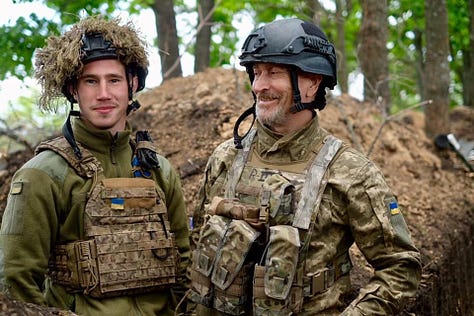
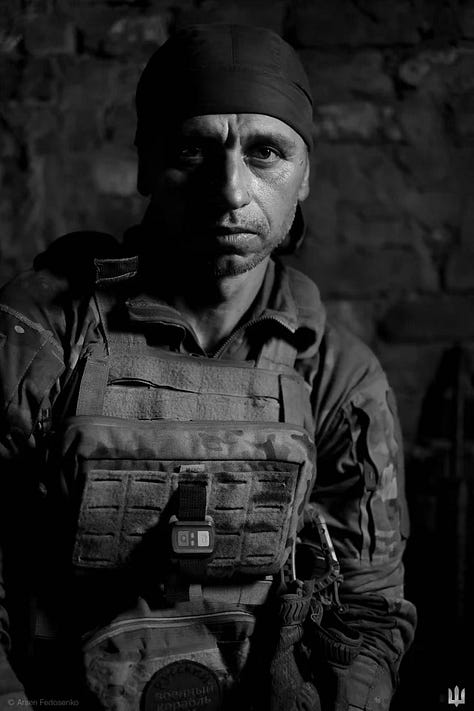
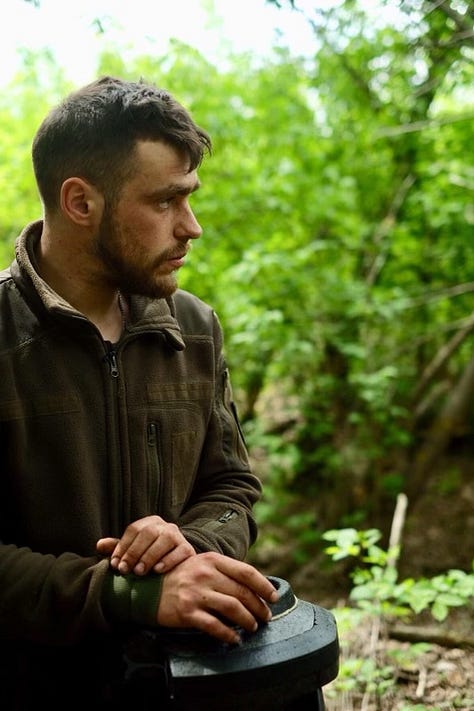

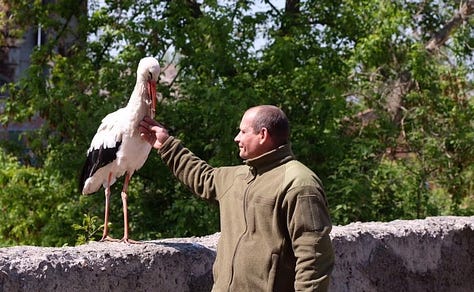
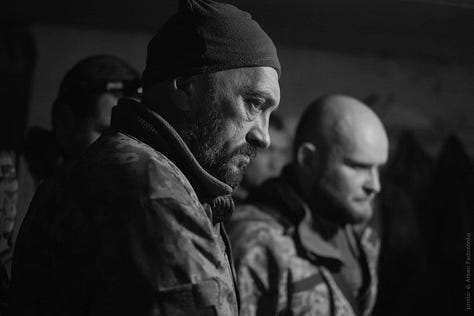
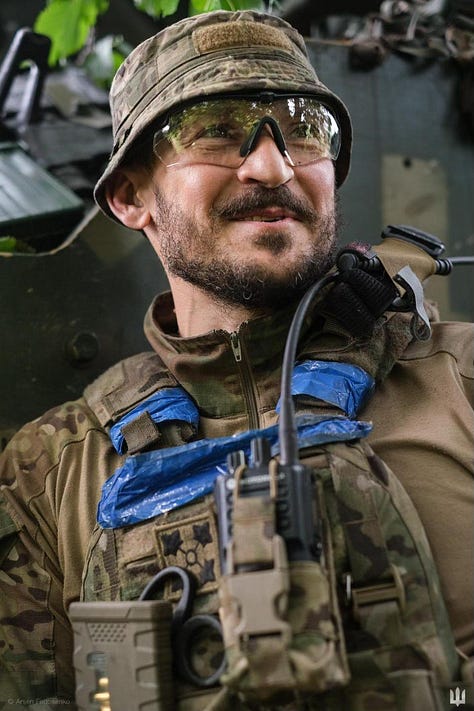
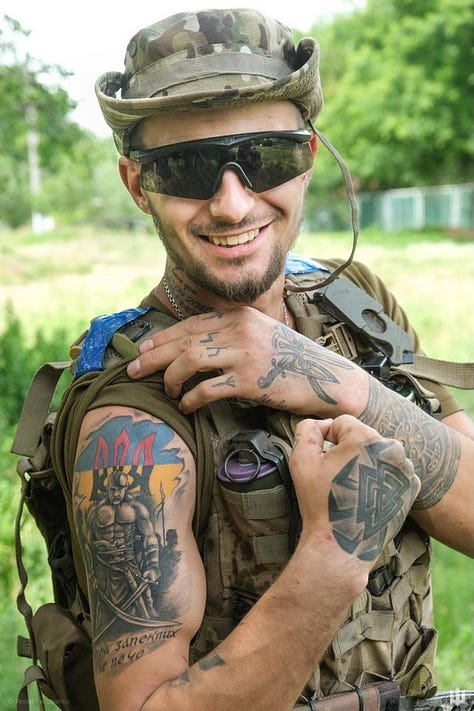
Fedosenko would always send copies to the men and women in them so they could see what he saw. In his words — “their values, thoughts, and motivations... In these faces, there is a clear understanding of why they are there, what they are fighting for.”
His photos are full of soldiers full of life who ultimately gave those lives for Ukraine during the past two years. Each one is a photograph of a choice to fight. Each one is a reminder of how much we have required of Ukrainians while we delay in accepting what our eyes show us about Russia.
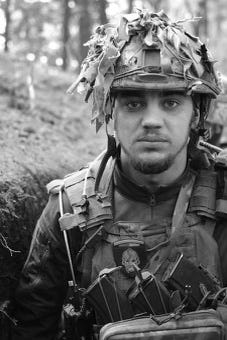
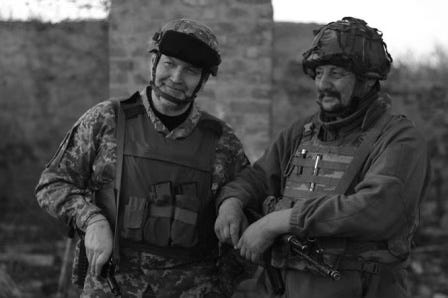
When the Russians advanced in the Kharkiv region again this spring, the AFU Stratcom media teams were back on the line. When Captain Fedosenko found himself in the path of a Russian glide bomb last week, it was far from the first time he and his fellow media team members came under fire. They had just left the frontlines in Kharkiv and come back for a rest when the bomb came.
I asked Fedosenko’s commander if he knew why he had chosen to sign up. “Because he was a patriot” was the instantaneous answer.
We minimize what is at risk in Ukraine to insulate ourselves from the cost of our failures to support the Ukrainians who have chosen to fight in a war they never wanted and did not ask for, but now must win if they are to survive as a people, a nation, a language, a culture, a history. Fedosenko showed us the faces of those Ukrainians. Fedosenko was one of those Ukrainians.
We know this war — for Russia — is as much about us as Ukrainians. But we don’t yet believe that this war is as much about us as the Ukrainians. We keep avoiding the necessary choices. We are losing opportunities to remember what we are. We keep forgetting what this war is.
It is a war to subjugate a people who managed to escape the inexorable gravity of Moscow — no matter how much money Russia used to corrupt Ukraine and its political class, no matter how many Russian agents were devoted to the task of Ukrainian captivity, Ukrainians said no, no, and chose again to revolt, to be free, to forge a different life in another direction.
It is a war to re-entrench us in the smoke and mirrors of Russian power and Russian risk-taking that has enabled every poor strategic decision we have made about Russia since the captive nations fled the Soviet Union and left Russia alone in the ruins of its own making.
It is a war to solidify Russia’s role as the system-wrecker behind which China watches and waits and plans.
It is a war to make us compromise what we know is right and strong and real, to make us walk away from the values that elevated us above the times when freedom meant only safety inside walls.
There are a lot of different kinds of Ukrainians who have chosen to fight Russia for us.
And one of those was Arsen Fedosenko.
I write these stories in the hopes that we — and in particular America we — will decide to remember what it means to be a great power, and to exercise great power in the world. That great power can be the color and not the grayscale of humanity — that it can expand and defend the world of light and beauty when the choices it enables are unflinching and clear.
Great power is absolutely nothing without brave men and women who arrive at the moment to say no — and are brave enough to stand against the supposedly inexorable forces.
Great power speaks with action, not with force. Great power is not a wall to keep enemies out — but an umbrella to welcome those who are still hungry enough for what we have to bolster it, fight for it, make it new again. It is the sword and shield — the will to defend, and the will strike down those who choose to come against us. The will to look at those who would take everything, and at the right moment to say — no.
There are those who will tell you the fight in Ukraine is not “existential” for America or the civilized world. That we have done enough. That avoiding an escalating confrontation between great powers is the only thing that matters.
But those people are wrong, and they do not get it. They don’t get America, they don’t get Russia, and they don’t get Ukraine.
Ukraine is the greatest power of this generation. It has utterly changed how we will think of power for the remainder of the century. The “great power” militaries are running to catch up to the innovation and transformation that Ukraine has accomplished under invasion, under fire, and while everyday Russia is trying to kill the men and women who are responsible for this salvation. The cadence of the loss, each one taking a future of Ukraine.
Left really alone in a crucible against a dying power, Ukraine has been forced to define what power is on its own. Every now and then there are absolutely untrue stories that pop up about how this or that intelligence agency “created” this Ukrainian initiative or that — but really, the truth is and has been since 2014 that the Ukrainians did it all themselves, and sometimes we help them by making it just so slightly easier. Sometimes.
If we let Ukraine fall, let Russia win and rest and come again, it would be as if we gathered at Collevile-sur-Mer not to commemorate the valorous dead who won a beachhead back toward the freedom that we once understood was the foundation of everything we are and everything we have — but instead that we stood at the edge of the raging sea to mourn what was lost and remains far away, out of our grasp and our graying imagination.
We will not be a great power as we navigate this troubled century if we let Ukraine fall. Neither America we, nor NATO we, nor Europe we. We will have to make other choices that will erode and not bolster the safety, prosperity, and freedom that we think are immutable. The grotesque luxury to be lazy about what freedom really is as we cosplay about liberty at home and fail to defend it abroad will be over. Another set of forces for whom that value of a single human life means nothing will control the shaping of the century, even as now they nibble away at our resolve with 10,000 tiny attacks.
Arsen Fedosenko traded a life of capturing beauty for a life of capturing the love and terror and loneliness and brotherhood of war. He showed us faces, sacred objects, joy, devastation, the vast and the small. He showed us moments of a war too immense to conceptualize in a way we could see clearly if we chose to look. He showed us who and what to fight for. He knew the war for what it was — and what it was for. He never looked away. He knew Ukraine will win.
Captain Arsen Fedosenko was a piece of great Ukrainian power.
What an engine Ukraine will be for the expansion of freedom, the expansion of the law and prosperity of civilization, when we unf*ck our Russia-blinded minds and embrace the future Ukrainians are trying to buy for us. This should be — in any sensible and honest world — absolutely the only thing we are focused on now. Instead, we minimize the scope of Russia’s machinery of death and horror so we can believe our own press releases.
We haven’t done enough. There is more we can do. We are avoiding our choices, and letting others make them for us.
Ukraine can win. Ukraine must win. And we must be brave enough to achieve it.
— MM
**This article is possible thanks to the generous support of Great Power subscribers. Please consider joining them if you haven’t already — lots of new pieces to come in the months ahead!



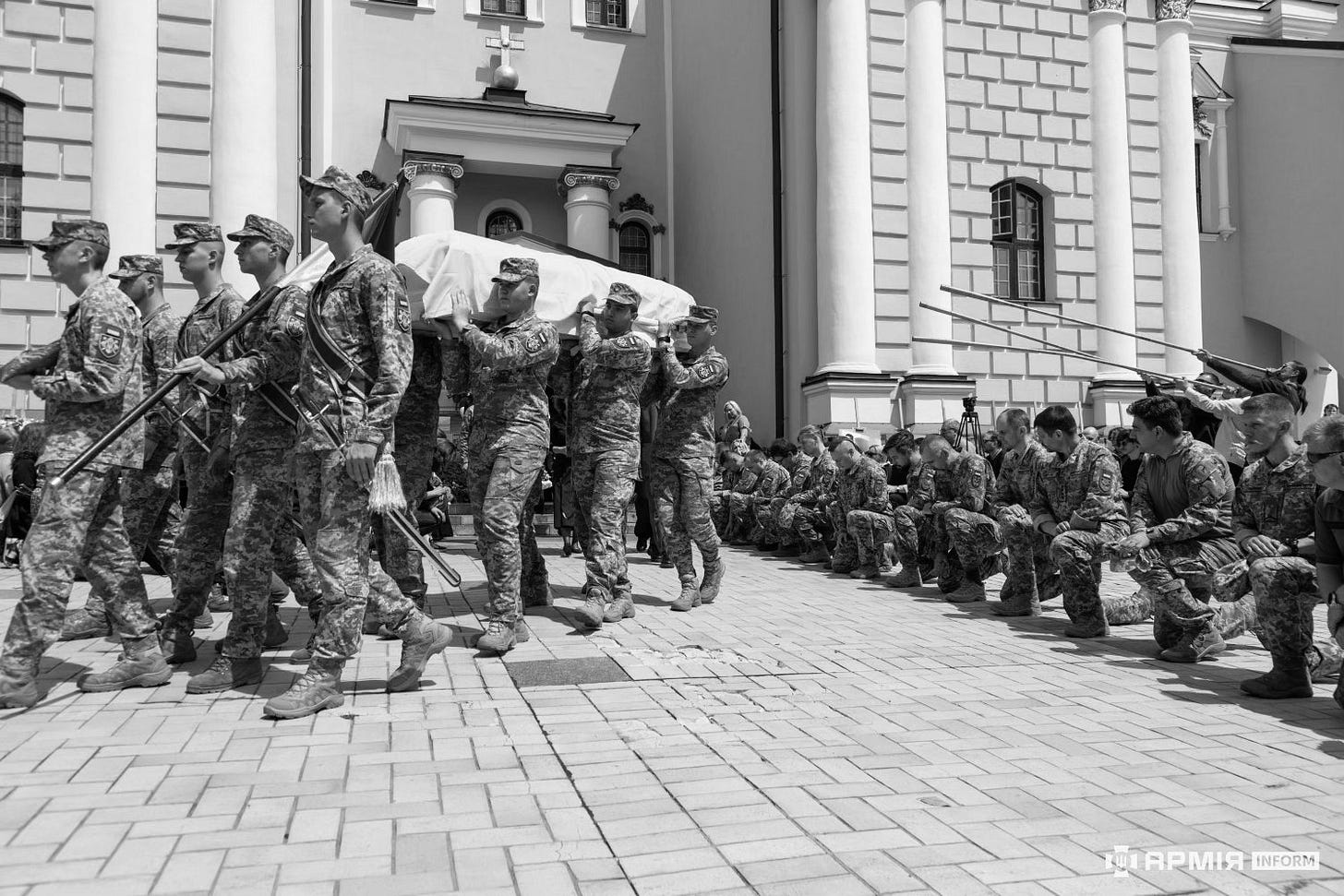
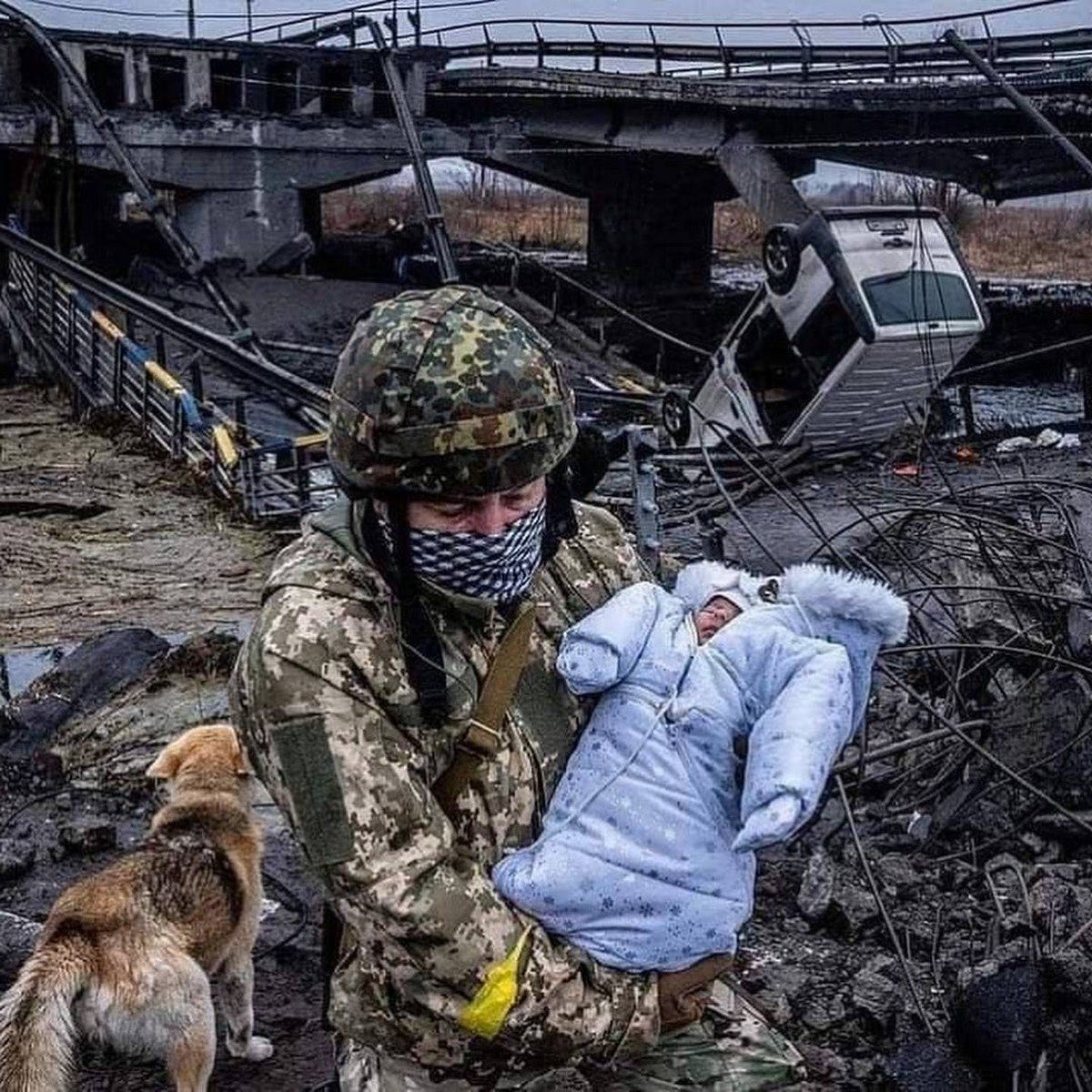


Thank you Molly for helping to keep our eyes and ears open. You are truly a champion of truth and reason in these dangerous times and I genuinely admire your efforts.